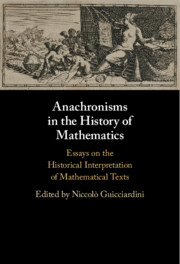 Anachronisms in the History of Mathematics
Anachronisms in the History of Mathematics Book contents
- Frontmatter
- Contents
- Contributors
- Figures
- Preface
- 1 Introduction: The historical interpretation of mathematical texts and the problem of anachronism
- 2 From reading rules to reading algorithms: textual anachronisms in the history of mathematics and their effects on interpretation
- 3 Anachronism and anachorism in the study of mathematics in India
- 4 On the need to re-examine the relationship between the mathematical sciences and philosophy in Greek antiquity
- 5 Productive anachronism: on mathematical reconstruction as a historiographical method
- 6 Anachronism in the Renaissance historiography of mathematics
- 7 Deceptive familiarity: differential equations in Leibniz and the Leibnizian school (1689–1736)
- 8 Euler and analysis: case studies and historiographical perspectives
- 9 Measuring past geometers: a history of non-metric projective anachronism
- 10 Anachronism: Bonola and non-Euclidean geometry
- 11 Anachronism and incommensurability:words, concepts, contexts, and intentions
- Index
6 - Anachronism in the Renaissance historiography of mathematics
Published online by Cambridge University Press: 19 July 2021
- Frontmatter
- Contents
- Contributors
- Figures
- Preface
- 1 Introduction: The historical interpretation of mathematical texts and the problem of anachronism
- 2 From reading rules to reading algorithms: textual anachronisms in the history of mathematics and their effects on interpretation
- 3 Anachronism and anachorism in the study of mathematics in India
- 4 On the need to re-examine the relationship between the mathematical sciences and philosophy in Greek antiquity
- 5 Productive anachronism: on mathematical reconstruction as a historiographical method
- 6 Anachronism in the Renaissance historiography of mathematics
- 7 Deceptive familiarity: differential equations in Leibniz and the Leibnizian school (1689–1736)
- 8 Euler and analysis: case studies and historiographical perspectives
- 9 Measuring past geometers: a history of non-metric projective anachronism
- 10 Anachronism: Bonola and non-Euclidean geometry
- 11 Anachronism and incommensurability:words, concepts, contexts, and intentions
- Index
Summary
The historiography of mathematics in the Renaissance involves two kinds of anachronism. First, the tendency to anachronism in the authors themselves, whose understanding of broad historical structures and of the development of mathematics may be colored by concerns of their own time. And second, our anachronism in reading these histories of mathematics as if they were attempting precisely the same thing as modern historians of mathematics. This article focuses on the author of the first modern work dedicated to the history of mathematics, Petrus Ramus (1515–1572), singling out three occasions in which his historical account seems to diverge widely from that of modern historians, and examining them in the light of both types of anachronism. First, in his account of the development of mathematics in the early Platonic Academy; second, his assessment of Eudoxus of Cnidus; and finally in his dating of the Neoplatonic philosopher and commentator on Euclid, Proclus.
Keywords
- Type
- Chapter
- Information
- Anachronisms in the History of MathematicsEssays on the Historical Interpretation of Mathematical Texts, pp. 167 - 195Publisher: Cambridge University PressPrint publication year: 2021


